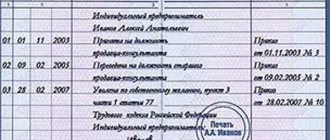Reasons
Article 84 of the Labor Code of the Russian Federation spells out the basic rules for early termination of an employment contract by the manager. For certain specialists there are special regulations, which are fixed in the eighty-first article.
To terminate an employment relationship unilaterally,
compelling reasons . An employee can be fired, according to the law, for one or more reasons. They are divided into types and are subject to legal regulation. Below we list the most common of them:
- Reasons for probation.
Read more about dismissal during a probationary period in our article.
The manager may terminate the relationship if:
- the citizen does not fit the declared position;
- low level of completed tasks by the employee;
- the subordinate’s health has deteriorated and he is no longer able to perform his job duties;
- the employee periodically violates the internal work regime;
- absence from work for unexcused reasons;
- criminal violations.
- The company is being liquidated.
- The staff is being reduced.
- Change of founder.
The dismissal of an employee can also occur due to the liquidation of the enterprise. This circumstance is based on the norms of the eighty-second article of the Labor Code of the Russian Federation. This circumstance relates to structural changes , the company is ultimately destroyed.
When the number or staff is reduced (Article 81 of the Labor Code of the Russian Federation), the staff schedule undergoes changes, and the number of vacancies, accordingly, decreases. The process is accompanied by a change in the staffing table approved by the order.
A reorganization is being carried out , which involves replacing the founder. The legislation applies here (Part 1, Article 81 of the Labor Code of the Russian Federation) and applies to the following persons:
- heads of organizations;
- branch managers;
- vacancy for chief accountant.
Under other circumstances, Article 75 of the Labor Code of the Russian Federation .
If the new founder considers it necessary, then previously working citizens will retain their jobs at the newly started enterprise.
This disciplinary sanction is subject to regulation by paragraph 5 of part 1 of Article 81. Of course, before a strict measure there must be the same action with the application of punishment, but in a more loyal form (a reprimand or a letter of complaint).
This measure is regulated by Article 192 and is applied in the following cases:
- the employee does not want to perform his job duties;
- there are several absences available;
- going to work drunk.
An employer has the right to dismiss a subordinate in the following cases:
- an employee drank alcohol at work;
- came to work drunk;
- committed petty theft;
- revealed state secrets;
- was at work under the influence of prohibited substances.
In this case, acts of violations must be drawn up. Without accompanying documents and confirmation, dismissal will be impossible.
This applies exclusively to teachers and educators working with minors. The case must be considered within one month . It will be necessary to prove in court that the violation falls into the category of immoral acts.
A manager may be held accountable if the result of violations is the following:
- in case of injury;
- after causing material or moral damage;
- other.
The founder must file a claim with the court within a month.
Calculation is not the fault of the employee
In some situations, the employer is forced to terminate the employment relationship with one or more persons, but through no fault of theirs. In practice, the enterprise may be completely liquidated, resulting in the dismissal of personnel. In addition, in the current critical situation, with sufficient justification, a reduction procedure is allowed, as a result of which the number of staff is reduced by one or more employees.
An employer can fire on its own initiative even in case of optimization. The procedure differs from a regular reduction and involves settlement, transfer to another position or transfer to another branch or division. A change in the owner of a company also involves breaking employment contracts with employees, since the new owner has the right to hire other people.
The law allows the option when the manager dismisses a person who cannot continue working for health reasons and has medical confirmation of this. However, first the company is looking for a place for him where he could work without compromising quality and his own health. Termination of an employment contract is impossible if the employee is on sick leave.
Restrictions apply to some categories. For example, the following cannot be deprived of work on a general basis:
- minors;
- pregnant women;
- single mothers with a child under 14 years of age;
- persons who care for children under 3 years of age;
- persons caring for a disabled minor.
These people are subject to the same requirements; they can be fired for violating labor discipline or due to a change of ownership. But the procedure is carried out in accordance with separately specified rules and conditions.
https://youtu.be/YwGUm6Bi7oo
Is it necessary to inform the employee in advance, and in what cases?
to notify the employee in advance of dismissal in the following cases:
- Liquidation of the enterprise.
- The employee failed the test. In this case, the employee must be notified three days in advance.
- The staff is being reduced. A couple of months' notice is required.
- The term of the fixed-term contract has expired. Management is required to notify the employee three days in advance.
If the company closes its operations, then it is necessary to notify the employee a couple of months in advance in the usual case, and in case of seasonal work - a week in advance. If an urgent agreement was drawn up, then within three days.
Notification is not required if:
What to do in case of wrongful dismissal
Some employers use illegal pressure on employees to obtain a sign of voluntary dismissal.
The methods are very different: some people have personal conversations, during which the boss “convincingly asks” to voluntarily leave the workplace, and some are threatened and given various arguments.
Most often, such employers offer a choice – voluntary dismissal or a negative entry in the work book.
The most arrogant bosses often resort to forgery, preparing a resignation letter on behalf of an employee or giving them a ready-made document for signature with an open date (which they set themselves).
Such methods are prohibited by law. There is no strict procedure for protecting yourself from unscrupulous employers, but knowing the law and following simple rules will help prove the truth.
There are 3 ways to protect your interests in the workplace:
- do not sign a resignation letter. Employers should be aware that in 2004, the Supreme Court ruled that voluntary dismissal is only possible at the initiative of the employee. Falsification can be proven by handwriting examination, there were judicial precedents, the law sided with the employee;
- obey labor discipline and not respond to provocations. Do not accept dubious offers from employees to leave work early or stay home when there is no official day off;
- if the citizen received oral orders, demand written execution. The documents will help during the trial. For example, an employee has the right to indicate that it is impossible to fulfill the obligations prescribed by the boss. It is important to formalize all disputes, then forced dismissal will be proven.
Procedure
Article 84 of the Labor Code of the Russian Federation streamlines the procedure for terminating an employment contract. The employment contract ends by issuing an order by the employer. The order must be provided to the employee so that he can sign the document.
The dismissal order form can be found here.
If the employee requests, he must be given a certified copy of this order. If the employee does not want to sign the document, then this must be noted on the order.
Further, on the day of termination of the employment agreement, the employee receives his salary, and he must also be paid all the accruals due to him. If an employee did not perform his job duties on the day of dismissal, then all payments to him will be made no later than the next day.
If disputes arise about the amount of payments, the manager is obliged to pay the undisputed amount within a certain period of time.
If an employee does not have the opportunity to personally receive a work book, then he is sent a notification about the need to come for it.
From this moment on, the employer is not responsible for the delay in issuing the document.
https://youtu.be/nlx5L5MOLvA
Termination of contract with disabled people
People with disabilities have certain advantages over other employees. No matter how much the owner of the company wants to fire them, he will either have to find good reasons for this, or leave the person in his position. Current legal restrictions make it possible to dismiss, at the initiative of the employer, someone who is declared incapable of work. To make such a decision, a medical commission meets and a disability group is determined. If the first group is confirmed, the person will be dismissed without any other grounds.
For disabled people of groups 2 or 3, it is possible to remain on staff, but in a position that they can occupy and perform all functions due to health reasons. In accordance with the adopted benefits, such people are entitled to 35 hours of working time per week, work only on day shifts and an extension of vacation to 60 days. If, even with such a schedule, the employee takes partial sick leave and fails to cope with the tasks entrusted to him, the decision to dismiss can be made either at the initiative of the owner or by mutual agreement.
If you receive notice of termination of your contract, you can try to save your job. But to do this you will have to collect unequivocal evidence of your own innocence. Additional protection can be provided by a trade union, which often advocates on the side of workers. For example, if a boss decided to fire a subordinate for absenteeism, but a certificate from a medical institution was subsequently provided confirming the absence, then the decision is canceled.
https://youtu.be/-E331TQEE3E
In each specific case, an unpleasant situation can be avoided if the offense or minor violation is committed for the first time.
Providing false documents
When applying for a job, an employee provides the employer with a fairly large package of documents that are provided for by law or the rules of a given enterprise for a specific case.
These can be diplomas, medical certificates, personal documents, etc. Regardless of whether original documents or copies are to be submitted, they must provide only truthful information about themselves.
If it is revealed that a document has been falsified or the employee has independently corrected something in the original, this can easily lead to dismissal in accordance with this article.
Depending on what particular fact of forgery has been identified, a decision will be made to report to law enforcement agencies. For example, if an employee, for personal reasons, reduced her age in her passport, then this may not be reported. But if a person has forged a diploma or passport, then this is a significant and gross violation of current legislation and entails criminal liability for both the manufacturer of the forged document and its user.
If, thanks to forged documents, a person received any additional material benefits, then he will be obliged to fully compensate the employer or the state. For example, if, on the basis of a fake medical certificate, he received any additional payments as a disabled person.
In some cases, the employer may even demand compensation for damage caused. For example, if a doctor provided a fake diploma and at the same time damaged the image of a private clinic with his incompetent work, then the management has the right to legally demand compensation from him for moral damages and losses to the company.
Often management can move on to direct intimidation with more serious consequences, but if the employee is confident that he is right, then he should in any case seek protection from the competent government authorities.
Sometimes the manager openly takes advantage of the ignorance of the employees or is not very competent in personnel matters (often this is possible in private enterprises, when the manager simultaneously performs the functions of an accountant or HR specialist). When dismissing, some legislative norms are interpreted slightly differently, and the employee, out of ignorance, does not seek to verify the authenticity of the manager’s words. This is completely false. If the dismissal occurred at the initiative of the employer and a corresponding entry was made about this in the work book. The article and paragraph of this norm are indicated there. Next, the employee first of all needs to familiarize himself with the wording of this norm and what the registration procedure should be in order for the dismissal to be lawful. If there are any violations, then it is necessary to prepare a complete list of documents and apply for protection of your rights.
To decide where to go, it is important to first determine the stated requirements: if there are any material requirements, then the issue needs to be resolved only in court. In other cases, you can contact the Labor Inspectorate. This body has a huge list of powers, but it will not be able to forcibly collect anything from the company. It is also practically impossible for representatives of this organization to be reinstated. You can, of course, first try to resolve the issue through the Labor Inspectorate (often employers still comply with its instructions), and then, if necessary, go to court, but then it will take more time.
In case of wrongful dismissal, the employee will have the right to receive not only his place of work back (to be reinstated in exactly the same position from which he was unlawfully dismissed), but also to receive wages for this period, all compensation, as well as moral damages (practice shows However, the court rarely awards moral damages - only financial losses actually caused).
You can go to court at the place of registration of the enterprise or your own. But it is important to take into account the fact that this must be done within 2 months after the official issuance of the dismissal order. Otherwise, it will be impossible to prove anything. The only exceptions are those cases where the plaintiff proves that he really could not, for objective reasons, go to court in a timely manner.
The application must consist of several points:
- details (who is filing the claim, against whom and to which court);
- essence of the question;
- applications (list of documents);
- requirements.
It is mandatory to attach: a dismissal order, a copy of the work record book, a certificate of income (on the basis of the data in it the claims for the claim will be calculated), as well as any additional documents that are relevant to the case. For example, if a woman was laid off from her job, but she has a child under 3 years old, then it is necessary to additionally provide his Birth Certificate.
It is also necessary to pay attention to the fact that the claim must always be drawn up in compliance with the standard standards for such appeals. Simple and understandable rules will help to significantly increase the chances of a successful resolution of a controversial issue in favor of the plaintiff, as well as a quick consideration of the claim without delaying the process.
The basic rules include:
- Adhere to exclusively business style. Any requests containing obscene language or threats will be left without consideration.
- State the essence of the problem in detail, but to the point. Any descriptions of your emotions should be excluded.
- Events are presented in strictly chronological order.
- It is best to type the claim on the computer, since anything written in unclear handwriting will also be returned for revision.
- The text should contain as many references as possible to current regulations that confirm the validity of the stated requirements.
- It is recommended to attach as many documents as possible relevant to the case under consideration.
- If necessary, it is possible to include witnesses in the case.
- If any attempts have been previously made to resolve the dispute out of court (a complaint was sent to the company management or an appeal was filed to the Labor Inspectorate), then it is important to mention this. Even if for some reason the appeal was left without consideration, it still needs to be attached to the case and attention should be focused on the fact that there was no response. If an official response has been submitted, then the plaintiff provides a copy to the court.
To avoid any problems with filing a statement of claim, it is best to use a standard sample of this document, simply indicating in it the parameters for your case.
Thus, Article 81 of the Labor Code fully defines the list of grounds on which an employee can be dismissed against his will. Additionally, each of these points can be detailed by regulations or employment contract. But at the same time, this cannot contradict Article 81. If an employee is fired illegally, then he must necessarily go to court to protect his rights. It is important to approach your duties as responsibly as possible in order to avoid such unpleasant situations.
Labor legislation
The dismissal of an employee under Article 81 of the Labor Code is carried out at the initiative of the employer
With regard to work and rest, the laws of the Russian Federation try to provide employees with many social benefits and guarantees that would provide them with normal conditions, decent wages and confidence that in the workplace the employee will work as long as he wants. Therefore, legislation in matters of dismissal is often on the side of the employee, not the employer - after all, the latter has much more control levers than the former.
The precedents by which an employer can fire an employee are covered in Article 81 of the Labor Code of the Russian Federation, which is called “Termination of an employment contract at the initiative of the employer.”
It discusses several general cases that can concern absolutely any employee, no matter what position he holds, separately describes several points regarding the heads of organizations, their deputies and chief accountants, and also separately mentions people who are involved in education at work or deal with monetary transactions. Despite the fact that the provisions of this article seem to give the employer the right, if necessary, to get rid of an unwanted employee, in reality everything may not be as simple as it seems.
Dismissal due to loss of trust in a subordinate or his immoral act
The seventh paragraph states that employees directly servicing monetary or commodity assets are subject to dismissal if they have committed guilty actions that entailed a loss of the manager’s trust.
This applies to financially responsible persons:
- cashiers;
- accountants;
- sellers and so on.
The procedure for dismissal under Article 81, paragraph 7 is the same as under the sixth paragraph of this article. Labor law requires that the actions of such an employee must be intentional. If they occurred due to negligence or only part of them was proven, the dismissal can be challenged in court.
If the offense was committed at the workplace, then the employer has one month for investigation and disciplinary action, but if the actions were carried out outside the place of duty, then a year.
The calculation is made in the same manner as for dismissal for absenteeism.
Paragraph 8 of Article 81 applies only to workers performing educational or educational functions. A teacher can be fired for immoral statements or unacceptable behavior both in and outside the workplace if he is caught doing so.
https://youtu.be/3xMuxcYa5HI
Can they be fired under Part 3 of Article 81 of the Labor Code of the Russian Federation in the absence of higher education?
An employer can initiate dismissal of an employee if he is not suitable for the position due to insufficient qualifications (Part 3 of Article 81 of the Labor Code of the Russian Federation). Qualification is confirmed by certification results. The very concept of “qualification” implies the level of knowledge and skills of an employee in the profession. There is no mention of the employee’s education in the specified norm, however, the presence of education is one of the factors that is assessed by the certification commission. It is impossible to terminate a contract with an employee without grounds. The basis in our case is the findings and conclusions of the certification commission. And such a commission evaluates the level of business skills of the employee, including the level of education. In 2012, Article 195.2 of the Labor Code of the Russian Federation was introduced on professional standards and the level of qualifications required to engage in certain professional activities. But the demands of Prof. standards are mandatory only if the relevant provisions are enshrined in local regulations. acts of a specific employer and in the employee’s job description. Thus, it turns out that dismissal due to lack of higher education is possible under certain circumstances. If prof. standards establish the need for higher education to work in the profession, and at the same time, the provisions of the standards are supported by the regulations of the organization, then the employee can be dismissed for inadequacy of the position held. However, the certification commission cannot be guided by prof. standards. If the company’s documentation does not contain any requirements for higher education, then the dismissal of an employee under Part 3 of Article 81 of the Labor Code of the Russian Federation is unlawful. So, an employee can be fired due to lack of education only if the requirements for the need for a university diploma coincide in national professional standards and the company’s regulatory documents.











